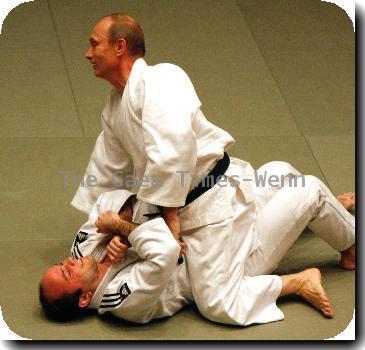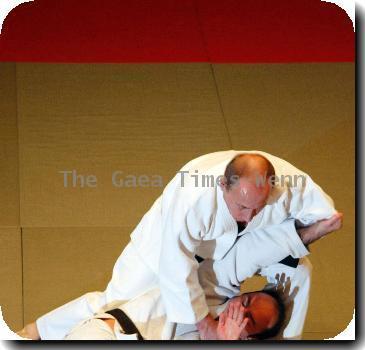Ukrainian premier, former Kremlin critic, pledges better ties to Russia if she wins presidency
By Simon Shuster, APThursday, January 14, 2010
Ukraine’s Tymoshenko seeks better ties to Russia
KIEV, Ukraine — The front-runners in Ukraine’s presidential race have vowed to revive ties with Russia if elected — a strong signal that Sunday’s vote could mark the end of the Western-oriented leadership ushered in by Ukraine’s 2004 Orange Revolution.
Ukrainian Prime Minister Yulia Tymoshenko, who sought to pull Ukraine out of Russia’s sphere of influence and toward Europe during the Orange movement, said in a last-minute appeal to voters that as president she would work closely with Moscow.
Polls show Tymoshenko trailing pro-Russian opposition leader Viktor Yanukovych, the Orange forces’ most prominent foe, in the closing hours of the contest for Ukraine’s highest office.
Over the past year, Tymoshenko has developed a personal rapport with her Russian counterpart and former nemesis, Vladimir Putin. She has also courted voters, especially in the country’s Russian-speaking east and south, who want an end to tensions between Russia and Ukraine.
The former communist states share deep historical, linguistic and ethnic ties, but Kiev and Moscow have clashed in recent years over everything from the status of the Russian language to Ukraine’s bid to join NATO. The Orange Revolution was reviled in the Kremlin, which has since taken firm steps to avoid a similar opposition movement from arising in Russia.
In one of Tymoshenko’s firmest statements about Russian ties during the long presidential race, she said Thursday that she would avoid antagonizing Moscow and seek a partnership that would benefit both countries.
“I want both sides to clearly understand each other’s positions … and build mutually beneficial relations,” said Tymoshenko. “As the future president, I will aim for the most peaceful and constructive, but also firm and pragmatic, relations with Russia and other countries that are fundamentally tied to the national interests of Ukraine.”
In November, Putin praised Tymoshenko in comments widely seen as an endorsement of her candidacy. “We feel comfortable working with Tymoshenko’s government, and I think that during the time of our cooperation the relations between Russia and Ukraine have stabilized and strengthened,” Putin said in the Ukrainian city of Yalta.
Tymoshenko was one of the leaders of the Orange movement who called for reform of Ukraine’s notoriously corrupt government and tried to put the country on a path toward European integration.
But her alliance with President Viktor Yushchenko, the other leader of the Orange Revolution, broke down not long after the Orange victory amid recriminations and maneuvering for political advantage.
As the ruling duo, he and Tymoshenko have seen their popularity plummet largely because of their inability to handle the effects of the global financial crisis that hit Ukraine harder last year than almost any other country in Europe.
Yushchenko has seen his ratings plummet to the single-digits, making his re-election seem like a long shot. But the resilient Tymoshenko has retained sympathy among the electorate in part by tempering her attacks against the Kremlin and projecting the image of an industrious leader.
Known for her glamour and oratorical skills, Tymoshenko made her name and her fortune in the natural gas business as head of Ukraine’s largest energy company in the 1990s.
Later she moved into politics as a foe of President Leonid Kuchma, who courted the West but maintained close ties to Moscow during his decade as president between 1994 to 2004.
She gained international attention in 2004 as the blond-braided leader of the Orange Revolution, the nonviolent street protests that ushered her and Yushchenko to power in 2005 amid high hopes of EU membership and freedom from Russia’s influence.
In 2007, she wrote an article in the U.S. magazine Foreign Policy warning of Russia’s “remorseless imperial ambition” and calling for the West to oppose “Russia’s long-standing expansionism and its present desire to recapture its great-power status at the expense of its neighbors.”
The article was written at a time when President George W. Bush was taking a firmer stand against Russia’s continued dominance in the former Soviet Union, and NATO was actively considering membership for Ukraine and Georgia, despite Moscow’s fierce objections.
Since then, the Obama administration has sought its own “reset” of relations with Moscow, seeking to reduce tensions with the Kremlin through talks on arms control and other issues. NATO has put Ukraine’s and Georgia’s membership plans on a back burner, while seeking greater help from Russia in the war in Afghanistan.
Tymoshenko, known for her quick wit, pragmatism and shrewd political instincts, has responded with a far more conciliatory tone toward the Kremlin, tacking with the shifting political winds.
Today, Yushchenko is the only adamant Westernizer remaining among the major candidates.
At a news conference Tuesday, Yushchenko criticized Tymoshenko, charging she had abandoned the Orange movement’s ideals and struck a deal with Russia.
“Tymoshenko and Yanukovych are the united duo of the most complex and threatening Kremlin policy,” Yushchenko said, charging that both were working on behalf of the Russian government.
In 2004, Yushchenko beat then-Prime Minsiter Yanukovych after Ukraine’s high court threw out the results of a fraud-marred election. This year, polls show Yanukovych with the backing of about one third of voters while Yushchenko’s support has been measured in single digits.
Like Tymoshenko, Yanukovych pledged Thursday to restore friendly relations with Russia if elected, “the kinds of relations the people of Ukraine and Russia have dreamed of throughout our history,” he told local journalists in Kharkov, UNIAN news agency reported.
Local activists, meanwhile, staged a protest in central Kiev on Thursday to highlight what they saw as political prostitution in the campaigns. Members of the activist group FEMEN dressed as prostitutes and impersonated some of the leading candidates, underscoring a widespread sense of distrust toward government among Ukrainian voters.
Tags: Eastern Europe, Europe, Georgia, Kiev, Moscow, Russia, Ukraine, Vladimir Putin

